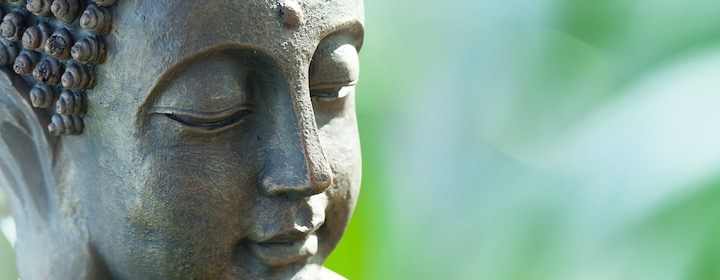Grief is an expression of love and loss. We may grieve the loss of someone’s life, or we may grieve the loss of a job, a relationship, or a way of life.
Impermanence is a central teaching of Buddhism. So, why do we Buddhists grieve when people or things or relationships end? Shouldn’t we know better?
Well, until we are fully enlightened, we will grieve loss. And, even then, loss may be painful. Just after the Buddha’s most favored disciples Sariputta and Moggallana died, the Buddha remarked how empty the sangha seemed. [1] This was an expression of the Buddha’s grief. Like the Buddha, we need to experience our grief.
But we don’t want to get lost in grief, at least not for long. Since losing my oldest child Justin to cancer five years ago, I have met many parents of deceased children through a wonderfully supportive organization known as “Compassionate Friends.” Unfortunately, some of the parents remained incapacitated many years after losing their children. In the early years after Justin’s death, I too had little or no energy. Changing the toilet paper roll seemed insurmountable. So, I purchased an open-armed toilet paper holder to make it easier but then couldn’t find the energy to install it. Even brushing my teeth was a challenge.
Now, thanks to my practice and a good grief counselor along the way, I have more energy. But I needed to go through a period of low energy and surrendering to my grief when it called in order to get to this place. During those first years, I found that there were two ways I grieved: one involved more suffering and the other involved less suffering.
Grief that involved more suffering included pounding the ground and a lot of mental stories like, “this shouldn’t have happened to me,” or “Justin shouldn’t have died before me,” or “how am I ever going to be able to walk on this earth for the rest of my life knowing that my beloved son isn’t also walking on it”?
Grief involving less suffering included little or no mental stories. I learned to disengage my mind and focus on my body. I focused on the physical sensation of grief in my body without adding anything from the mind. Thanks to Jonathan Foust’s teachings on Focusing in his Year of Living Mindfully course, I was able to get in touch with where in my body I experienced a felt sense of my grief, which included a heavy sensation in the chest area, a strained sensation in the throat, and moistness or tears in the eyes.
The ability to be present to these physical sensations of grief had the effect, over time, of purifying the grief. Now, every cell in my body seems to carry the fact of Justin’s death together with an adjoining cell accepting it. Of course, I still miss Justin and think about him every hour of every day, but mostly it is with a smile on my face remembering him and without a demand that he be alive or that things be any different than the way they are.
This is the promise of the Buddha’s teaching in the Dart Sutta (discourse) [2]. In it, the Buddha said there are two ways of responding to the darts life throws at us. One way is by picking up a second dart and hitting ourselves with it just after being hit by the first one, which of course exponentially adds to our suffering. The second dart we hit ourselves with represents our mental stories about what has happened. The other way of responding to life’s darts is by turning towards the unpleasantness in the body, without adding the mental story. This second way of being with life’s darts, by turning towards their unpleasantness without adding story, is a way to grieve without suffering.
The teaching in the Dart Sutta is evidenced by the two ways I grieved Justin’s death. When I added a story about how unfair it was, how it shouldn’t be the way it was, how wronged I felt, I suffered more. But when I could get to the point of turning towards the grief without adding story and just be present to the physical sensations of grief in my body, I suffered less. Experiencing the grief was still painful, but the mental suffering lessened. Over time, with repetition, being with grief in this way had a purifying effect on it so that it no longer weighed me down. Eventually I attended a month-long retreat at the Forest Refuge with Joseph Goldstein. There, I experienced the vast, empty nature of mind that could make space for and hold my grief no matter how big it wanted to get.
Turning towards grief and being fully present to it takes courage, great heart, and patience. And, it is so worth it. I recently moved to Ohio to live closer to my other child, who is very much alive. I live so close that his four children can walk to my house unchaperoned. Seeing a grinning grandchild at my front door is pure heaven! And, my new house came already outfitted with open-armed toilet paper holders! I believe that fully turning toward my grief has allowed me to be more fully present to my own life, and to my living child and his family.
May all beings find the heart to turn towards their grief, the courage to be fully present to it without adding story, and the patience to be with it until it is purified.
[1] https://suttacentral.net/sn47.14/en/sujato
[2] “Sutta” is the Pali word for “discourse.” After the Buddha’s death, his teachings initially were recited verbally, and then eventually were written down in the language of Pali, a language regarded as close to the language the Buddha spoke. The Buddha’s teachings are recorded in the suttas of the Pali Cannon.



